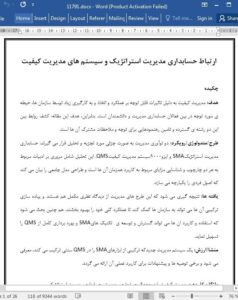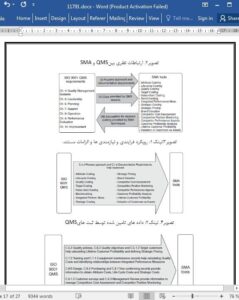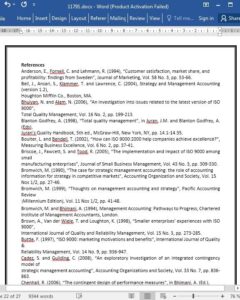Abstract
Purpose – Quality management is gradually becoming an area of interest among management accounting practitioners and scholars because of its significant effects on performance and increasing adoption by organizations. Therefore, the purpose of this paper is to explore the relationships between these two broad disciplines and provide guidelines for their joint consideration.
Design/methodology/approach – Two specific management innovations are analyzed in detail: strategic management accounting (SMA) and ISO 9000 quality management system (QMS). Such an analysis includes a literature review of both frameworks, the identification of benefits associated with their simultaneous application and the design of a comprehensive model integrating their individual principles.
Findings – It is concluded that these management schemes are compatible and complementary from a theoretical standpoint; and that, therefore, their combined implementation might help organizations improve overall performance. It is also argued here that their use in conjunction could facilitate the spread of SMA techniques and the full exploitation of QMSs.
Originality/value – A new management system proposing the incorporation of SMA tools into traditional QMSs is introduced, and some recommendations for its practical use are presented.
1. Introduction
During the last few years, management accounting literature has progressively recognized the growing influence of quality management on management control systems. Nevertheless, academic studies providing guidelines for the integration of these two distinct disciplines in practice are still scarce. Due to its strategic focus, strong interaction with operational processes and direct connections with different interested parties, strategic management accounting (SMA) appears as a possible link between conventional managerial accounting practices and traditional quality programs.
6. Summary and conclusions
It can be claimed that, although rather superficially, the association between management accounting and quality management has lately begun to be addressed in literature. During the last few decades, several management accounting scholars have stressed the importance of considering the implications of TQM principles when developing new management control models (see Hilton, 2005; Johnson, 1994; Kaplan, 1983; Shank and Govindarajan, 1995). Coincidentally, quality management specialists have started to acknowledge the advantages of incorporating accounting and financial components into quality programs (see Gryna, 1998; Rodchua, 2006; Schiffauerova and Thomson, 2006; Sower et al., 2007; Tye et al., 2011). Furthermore, some general findings about the reciprocal effects of these two disciplines when applied in conjunction have been reported in international journals (Fullerton et al., 2014; Hoque and Alam, 1999; Modell, 2009). The aim of this paper is to contribute to this integrative trend through the exploration of the relationships between two specific frameworks: SMA and QMS










